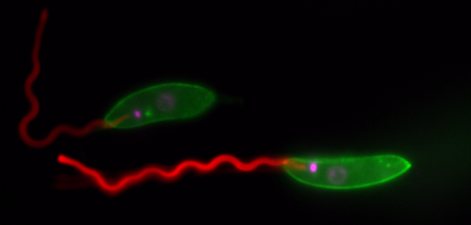Gluenz group gets funding boost for tropical disease research
A Dunn School research project led by Eva Gluenz to better understand the life threatening tropical disease, leishmaniasis, has secured a three-year MRC research grant from October 2017.
Leishmaniasis is a parasitic disease associated with extreme poverty and conflict. Up to one million new infections occur every year, causing death in 20,000 – 30,000 cases.
Basic research into the parasite’s biology is crucial in the global battle to combat the disease. The aim of the project, “Dissecting the role of the Leishmania flagellum in pathogenicity” is to investigate how Leishmania parasites are able to infect and survive inside macrophages and cause disease. The project is using new genome engineering methods to generate a library of 500 mutant cell lines, to interrogate systematically which parts of the parasite’s flagellum are required for infection.
Eva explains: “Leishmaniasis belongs to a group of neglected tropical diseases (NTD) that poses a huge health burden on some of the poorest communities in the world with a detrimental impact on economic development in endemic areas. This fundamental research employs advanced cell biology methods to dissect the interactions between the parasite and its host cell and links dissection of molecular mechanisms with structural studies of flagellum/cilium biogenesis and function.”
The research findings will be shared widely and should lead to new hypotheses to inform drug and vaccine development.
The project is jointly funded by the MRC and the Department for International Development (DFID) under the MRC/DFID Concordat agreement.

